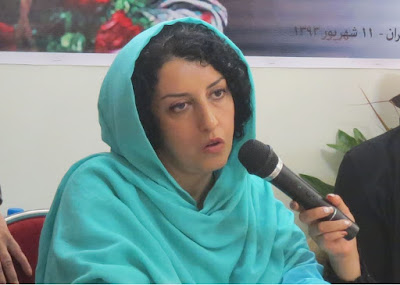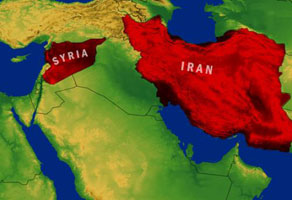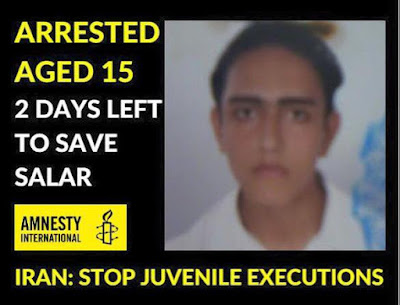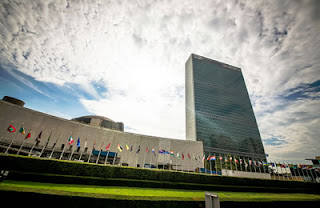 |
| Political prisoner Nargess Mohammadi |
Political prisoner Nargess Mohammadi, Vice-President of the Human Rights League, wrote an
open letter to Tehran's Prosecutor, explaining conditions of her dispatch to
hospital and protested the way she was treated by security forces in this
process.
Text
of her letter is translated below:
The
Honorable Jaafari Dowlat Abadi
Tehran’s
Prosecutor
Greetings,
On
October 5, I reported for inspection before being sent to hospital. I told the
female guard that I would probably have to undergo echography for my heart; so,
please don't come behind the partition when I take off my clothes. She said,
“No. We must come.” I asked her to go with me to the colonel so that we could
resolve the issue, but the colonel was not in. I explained the situation to his
deputy and I said it was not morally and religiously proper to do so. The
person in charge of sending me to hospital impudently and in an offending
manner said, “You shouldn't speak of religion. If you were Muslim, your place
would have not been in Evin.” He went on with more abusive words and manners. I
returned to the ward because I was not feeling well.
The
next day, I suffered a sudden attack and a nervous seizure. My beloved
cell-mates helped me walk from the second floor down to the ward's entrance on
the first floor because there was no [wheelchair or any] other equipment in the
ward. Then they got me on the ambulance. The ambulance's door could not be
completely closed. My head was located near the half-open doors and while I was
in a terrible condition, I had to also worry about the likelihood of falling
out of the ambulance.
Evin's
dispensary had coordinated my transfer with Imam-Khomeini Hospital as an
emergency case. I was lying on the stretcher in the ambulance, when suddenly a
female soldier and two male soldiers came with handcuffs and shackles and stood
over my head. I put my hands under my arms and said, "I won't allow you to
handcuff me, because I'm really not feeling well and I won't be able to escape.
On the other hand, you are four people inside the ambulance. What do you need
the handcuffs for? The female soldier said, “Even if you go into coma, we are
supposed to handcuff you” and then she put the handcuffs on me.
I
had become really nervous and my convulsions began. Then I had another nervous
seizure so they had to stop the ambulance for a few minutes by the side of the
road.
When
I was placed from the ambulance on the hospital's stretcher, they put back the
handcuffs. In all the stages at the hospital, from the beginning to the end
when I left the hospital, I had to wear the handcuffs and they were attached to
the stretcher. The only time they removed the iron handcuffs was for the CT
scan.
A
neurologist came to me and explained that because I had that nervous convulsion
I had to be monitored until the next morning and that I had to be hospitalized
for three days. In light of the history of my disease since 2010 in the
solitary cells of the 209th ward of Evin, and considering the difficult
conditions including the handcuffs, I asked the doctor to release me at my own
consent. So the honorable doctor wrote a letter indicating that the patient
needs to be visited by her doctors but she can leave the hospital.
After
five days, I was finally hospitalized. Since the moment I was sent to the
hospital, my hands were in handcuffs, even when the doctor was examining me. My
handcuffs were not removed, even when he was taking my blood pressure. When we
entered my hospital room, the soldiers immediately handcuffed me and tied me to
the bed such that I could not even sit or sleep comfortably.
Due
to nervous pressure, my situation deteriorated further more. My requests and
protests went unheeded. From October 11 to October 19 (nine days), I was held
without permission to be visited even by my parents. I was not allowed to go
out of the room. I was on the bed and I could only use the bathroom. It was
forbidden for me to have money and they did not even bring me the fruits I had
in the ward in prison, either. I had nothing to eat except for hospital food.
The room's door and curtains were also closed all the time.
Two
days after I was hospitalized, I went unconscious in the examination room. So
upon doctor's instructions, two nurses came the next day to give me a bath and
wash my hair and prepare me for brain scan. The female soldier immediately
called the colonel and asked for instructions. The instruction was that she had
to accompany me in the bathroom. In protest to such a decision and such an
inhuman treatment I went under the shower with all my clothes on and the female
soldier was also present.
On
October 18, the colonel came to my room. I asked him to please allow me to be
examined alone whenever I had to undress for certain checkups or examinations
and the female soldier can make her inspections beforehand and leave, so that I
would not have to be examined in front of the soldiers. The colonel accepted.
From
October 20 to 12 noon on October 21, I was being prepared for endoscopy and
colonoscopy. I should have refrained from eating and I had to use 4 liters of
material that would wash away my digestive system. Finally at 1 p.m. I was
taken to the operation room. The female soldier also came in with me. I asked
her to please stay behind the door of the operation room. She talked to the
colonel and said that she would stay in the operation room. So, exactly at the
last moment that I was supposed to be anesthetized, I walked out of the
operation room and waited until evening may be she would agree to stay out, but
she did not.
I
talked to the colonel on the phone, explained my situation and asked him to
allow the female soldier to stay out of the operation room so that I could
receive my treatment. Again, he promised that the female soldier would stay out
and that I could repeat the stage.
Again,
the preparation lasted from 9 a.m. on October 24 until 12 noon on October 25.
As I was getting ready to go to the operation room, again the colonel ordered
the female soldier to stand inside the operation room during the colonoscopy.
So, I refused to go to the operation room.
My doctor
talked to the colonel on the phone and said they had to take samples. He
explained that this stage is necessary for treatment of the patient and that it
must be done in the operation room which is a sterilized environment and only
the doctor and the nurses are allowed to be present. He asked the colonel to
allow the medical operation go on, but the colonel did not allow the operation
even in the presence of military inspectors and for the second time, I was
deprived of receiving my treatment.














